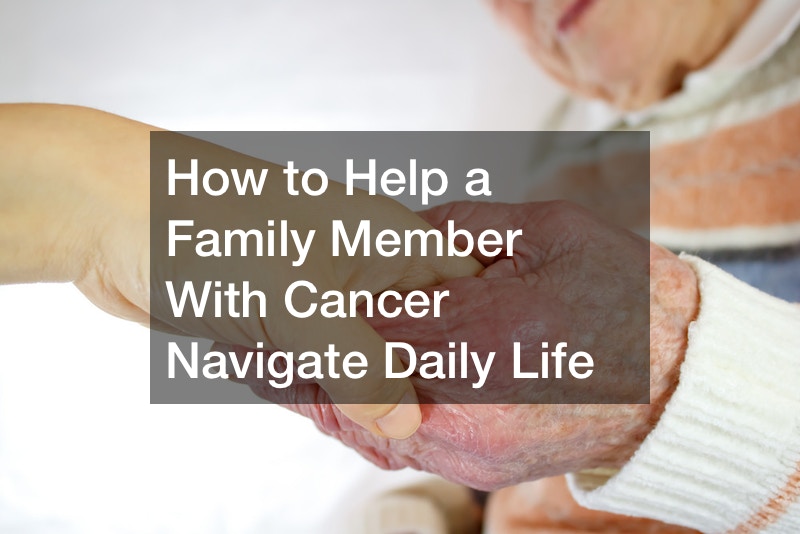
A cancer diagnosis can be devastating for the patient, family, and friends. Social and family support is so important for anyone that has been diagnosed with this disease. Many people want to help but they don’t know how to help a family member with cancer. These tips on how to help a family member with cancer manage day-to-day living can help you provide the support your family member needs.
Ask Them What They Want Help With
One of the top tips for how to help a family member with cancer is to let them take the lead. Ask them what you can help with. Maybe they need help with healthcare appointments and keeping them in order. Make yourself available.
Ask if they need someone to go to their primary care physicians with them. You could be the person that attends the appointments with your family member. Perhaps they need a ride because they don’t feel up to driving. Ask if they need help getting to the store, doing housework, or if they just want someone to sit with them.
You may be surprised that all your family member needs is someone there with them to have the courage to fight this disease. Many people find themselves without anyone to share a good time with. Picking out a couple of movies, making some banana drink mix powder smoothies, and settling into a nice place to relax together can make all the difference in the world. Even if they don’t need your help, spending time together can make a difference.
See If They Need a Change of Pace

If you want to know how to help a family member with cancer, get familiar with their community. For example, if your family member is over the age of 55, you could get to know the 55+ community and learn what they enjoy doing. It’s important that your family member stays as social as they can throughout the treatment. It will lift their spirits.
Ask your loved one often if they would like to go out for a meal to your local country club or any restaurant that they prefer. A change of pace can brighten a mood and help them to forget for a while what they are dealing with. Of course, it doesn’t have to be a restaurant; it could be a stroll through your local park, going to visit a friend, or any other activity that your loved one enjoys.
Make the effort to spend time doing things that your family members enjoy but never pressure them into doing something. It’s important that you respect boundaries and not push your view of what they should do. If your family member says no this time, ask again. Let them know that you are willing to do whatever they like.
Handle Emergency Preparation
When someone is diagnosed with a life-threatening disease like cancer, there is a lot for that person to think about, and a lot of preparations that need to be made “just in case”. One of the tips on how to help a family member with cancer is to offer your help with emergency preparations. Many people are caught off guard when they are diagnosed with this disease and they have nothing in place to protect their families.
Your family member may need help with finding the best trust company to help with estate planning. You can take a lot of the burden off of your family members by volunteering to help them get their affairs in order. While it may seem like a grim activity, it really is very helpful.
Gathering information and doing research for your family members that may be too tired to do it on their own will let them focus on their health. It will also give them peace of mind knowing you are worried about learning more about child tax credits and other things so they do not have to.
You should also take the helm of coming up with a family plan just in case your loved one needs more support during the treatment process. Compile a list of family members that can drop off meals, clean the house, and provide transportation if that becomes necessary.
It’s important that everyone hopes for the best but prepares for the worst to ensure that your family member has a team of support that can help them through this illness. This emergency plan should include information about who to contact like the oncologist’s name and number. It is important that there is an emergency plan in place because family members often panic and have no idea what they should do without one. For example, if your family member runs a fever, which provider do you call? Having a plan in place will help to keep the panic down and help bring your family members peace of mind.
You may have to ask some tough questions like who your family members want to make health care decisions for them should they become unable to. It is important to get all of this out of the way and get documents drawn up to ensure your family member’s decisions are honored.
Appreciate Life Together

One of the best ways to help a family member with cancer is to take advantage of time spent together. Get RV insurance for your RV and put it back on the road to take that trip to the Grand Canyon you have always talked about. Spend not just time together, but spend quality time together.
Take a spiritual retreat to the desert or at the beach, or the mountains, go wherever it is your family member favors, and spend time together getting in touch on a deeper level. Spiritual retreats are wonderful for the mind and spirit. It can help with stress.
Try something new together that you have always wanted to do. This is the time to really live. You can fund your trips and activities by connecting with an antique appraiser and possibly selling off some goods. Things will matter a lot less now, people, time, and relationships will far outweigh that old painting or statue. Sell it and raise the funds you need to have experiences with your family member.
Become an Active Listener
If you are wondering how to help a family member with cancer, the answer is just listening. This is a deeply emotional time for the entire family, but always keep in mind it is your family member that is going through the tough stuff. They will likely need someone to just sit and listen to them without offering solutions or mentioning their own feelings.
Having someone really hear your fears is important. It is also important that you try to keep your emotions in check. It is okay to talk about your feelings with your family members, but only if you can hold yourself together while you do it. You do not want your family members to feel like they are a burden and that they are making people upset by expressing their own fears and feelings.
Prepare yourself mentally for a range of emotions. Your family member may be angry, they may feel hopeless at times, they are likely afraid of the unknown, they may feel anxious a lot, and they may also have many great days where they are positive. It can be a rollercoaster of emotions. Prepare to sit and listen and learn not to take it personally.
Reach Out to Estranged Family Members

A cancer diagnosis is not the time to focus on family differences. If you want to know how to help a family member with cancer, one of the ways you can be of help is to put differences to the side. For example, if it is your sister with cancer, and you have always hated her husband, now is the time to mend fences. Positivity is the order of business in this situation. Now is not the time to hold grudges or to focus on differences, now is the time to come together for your loved one.
This is a very stressful time and that stress can magnify any past hurts or conflicts. Call a family meeting and discuss calling a truce to put the best interest of the family member with cancer first. Backbiting, arguing, and tension between family members is stressful for the family member that is fighting this disease.
Do Your Research
One of the best ways you can support your family members is to learn as much as you can about the diagnosis and treatment options. Read all the information that is available from reputable sources. Of course, you do not want to give unsolicited advice, but you can share what you have learned. Learning as much as you can will not only help your family members but it will help you to better understand what the family should expect during treatments.
Doing the research will also help you to be able to speak intelligently to the healthcare providers should your family member invite you to come to any of their medical appointments. Knowledge is power but avoid saying things like “I know what you should do” or talking about the statistics and survival rates, even if they are positive. You never want to deny the real struggle that your family member is going through by downplaying the disease.
Start a Meal Train

How to help a family member with cancer varies depending on the age of the person, what their family composition is, and whether they have a partner. However, everyone appreciates meals in the freezer for when they are not feeling up to cooking or they do not want to go out to get something to eat. A family member with young children needs someone to take over the meal prep and cooking. A meal train is a great way to provide support.
Contact other family members, neighbors, and friends and ask if they would like to participate in the meal train. Each person picks a date where they can guarantee that they will deliver a meal. It can lift some of the burdens off your family member.
You do not have to stop with meals. Ask if anyone would be interested in mowing grass, doing laundry, or even cleaning the house up. Getting all hands on deck so that your family members and their partner can focus on treatment and dealing with that would be really helpful.
You can have several lists of helpers going on at the same time. You can have a list of yard work volunteers, grocery shopping volunteers, house cleaning volunteers, and meal volunteers. Most people are more than happy to help if you ask. Your family member may feel bad to ask for help with chores they feel like they should be doing, so be their voice and ask on their behalf.
If there are children in the household, arrange for play dates and other activities to help with the children. Take them for the day yourself. Your family members will feel better knowing that the children’s lives are minimally interrupted.
Don’t forget about the primary caregiver. If your family member has a partner, that partner would likely appreciate being acknowledged and even given a break occasionally. Full-time caregivers often go unnoticed in times like these. Offer to provide respite care so that your family member’s partner can go do something they enjoy doing and have an opportunity to reboot.
There are a lot of ways to help a family member with cancer, but don’t forget to take care of yourself in the process. If you are not healthy, rested, and have stress under control, you cannot help anyone else. If you need to seek professional help to manage how you process the situation. Taking care of yourself will help you to take care of your loved one.



